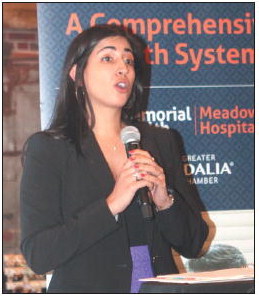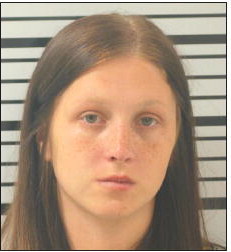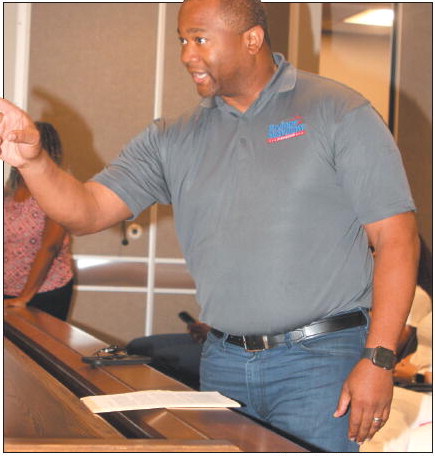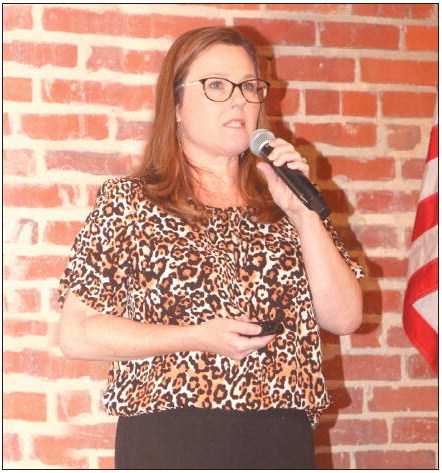ConnectHER Hosts Largest Crowd In Event History


mrandolphadvance@gmail.com
The Greater Vidalia Chamber’s annual ConnectHER Women’s event hosted a record-breaking crowd on Thursday, March 28, as 200 ladies came together to sip, shop, and encourage one another.
Mahsa Poorak, the current Chief Operating Officer of Southern Electric Company, a commercial construction company in Alpharetta, spoke to the audience about her journey into the construction indus- continued from page
try, and how the field has caused her to recognize the difference in society’s views of women and men.
“Working in construction was never part of my life plan. I knew I wanted to be an attorney from a young age. I actually remember sitting at the kitchen counter with my dad when I was in the 7th grade, and telling him that I was going to go to Emory University, and I was going to be an attorney,” Poorak explained. “I did that; I went to Emory for my undergraduate degree, and then to law school in San Francisco.
Meanwhile, Poorak’s father had begun an electric business in 1997, and worked until his untimely death in 2018. “At that time, I was practicing as a public defender in Oakland, California, and I had no intention of moving back home to Georgia,” she remarked. “Over six years in California, I created the life that I wanted for myself. I got a job right out of law school; I was living with my thenboyfriend (now husband). My life was proceeding according to the plan I had, but after my dad passed away, I had a choice: I could stay in California and follow the path that I picked for myself or take a leap of faith and try working in construction, which is an industry that I knew nothing about.”
She added, “When my dad passed away, I knew his company did lights. That was the extent of my knowledge about anything in construction. I also knew that if I came home and took this job on, I would be one of very few women —particularly in leadership — in that industry. But I knew if I didn’t take on that chance, I would never get an opportunity to run a company like that again.”
Poorak moved back to Georgia in September 2019, and has been working in the business ever since. “It’s been both a blessing and a curse at the same time,” she commented. “Management is by far the hardest thing I have ever done in my life, and anyone who tells you that it is a joy is lying. It is very hard, but it is also very rewarding.”
It was through her work with construction that she became acquainted with Vidalia and built a “random but wonderful” connection with the area, and specifically, the young women in the community. In January 2022, Poorak was invited to speak to legislators at the state capital regarding the challenges which her small business was facing. During this speaking engagement, she met Rep. Leesa Hagan of Lyons, who encouraged Poorak to participate in the “This Girl Can” program.
“I’m sure I don’t have to tell you this, but [Leesa] is truly fantastic, and so kind,” Poorak emphasized. “She told me about the program and told me to participate if I could. She introduced me to Paige Williamson, who is also such a gem – she is fantastic. I started working with her on ‘This Girl Can.’” In her work with “This Girl Can,” a local workforce development program that introduces young girls to nontraditional career fields like construction and truck driving, Poorak gathered women who work in construction from across the state and formed a panel to speak to the program’s participants.
“We talked about what our jobs were like, [and] what the career progression is like. We talked about the amazing financial opportunities that are available for people that work in construction, and it’s honestly one of the things that I think I am the most proud of that I have done in my job,” she explained.
Poorak noted, “It’s so rewarding to be able to see these girls starting to think about something that could be different for them that people don’t typically offer to them or even consider them for. Even if they don’t follow a path into construction, one of the things that I really like about the program is that it gives girls the opportunity to think about [the fact that] not everything that’s out there that people think is for boys is just for boys. I think there are a lot of really important lessons that the program puts out there, and I’m so proud to be a part of that.”
She continued, “Programs like “This Girl Can” are really important because the lessons that we learn as boys and girls when we’re growing up can limit the paths that we think are available to us when we are adults.”
Poorak elaborated on this concept, as she said that she had discovered boys and girls were each taught different things about themselves during their childhood. According to Poorak, boys are taught to be confident, take risks, and go after what they want in life, while girls are taught to chase their dreams only if they are safe for girls, to be cautious, and to look out for themselves.
“We raise boys who are unafraid to go after their goals. We raise girls who will go after their goals as long as it seems safe to do so; and that’s a very important difference,” she told the audience.
Continuing the comparison of lessons for boys and girls, Poorak shared that girls were taught to look out for others, as she reminisced on memories of her father telling her that she was the role model for her three younger siblings and that he needed her to look out for them. She also said that girls were taught to create paths that would ensure they did not need to be financially dependent on anyone; while men that she talked to reminisced that they had been taught to forge their own path and focus on their goals and desires rather than thinking of others. “These differences in expectations that we set in boys and girls carry with us into adulthood,” she added.
She gave examples of these expectations affecting adulthood, as she recalled her time living in Downtown Atlanta after high school, during which she was always sure to have a plan for safety and to be cautious; yet, her male friends in the city never had to plan for safety as she did. “It was understood that as women we had to watch out for ourselves,” Poorak remarked. “Guys have not been conditioned so that they have to protect themselves from the world and the actions of others.”
She noted, “Ultimately, men and women interact with the world differently based on how we’ve been raised. Men develop the ability to just go, to take risks and deal with whatever comes to pass after. Women have to evaluate each situation, assess the risks, and make a plan for the future.”
Poorak summarized. “To be a woman requires logistics, scheduling, and coordination, and it is, in my opinion, those exact reasons why women make more effective leaders.”
She shared numerous stories of her time in both the law and construction industries where being a woman had proved to be both advantageous and challenging. She encouraged the women in attendance that times are changing and men are more open to women in leadership. Women leaders are becoming more common, as it is being discovered that women have the capability to be excellent leaders exactly because of the skills that Poorak previously listed.
The event ended with fun, as several raffle prizes were distributed and women continued to fellowship and enjoy each other’s company throughout the night.





